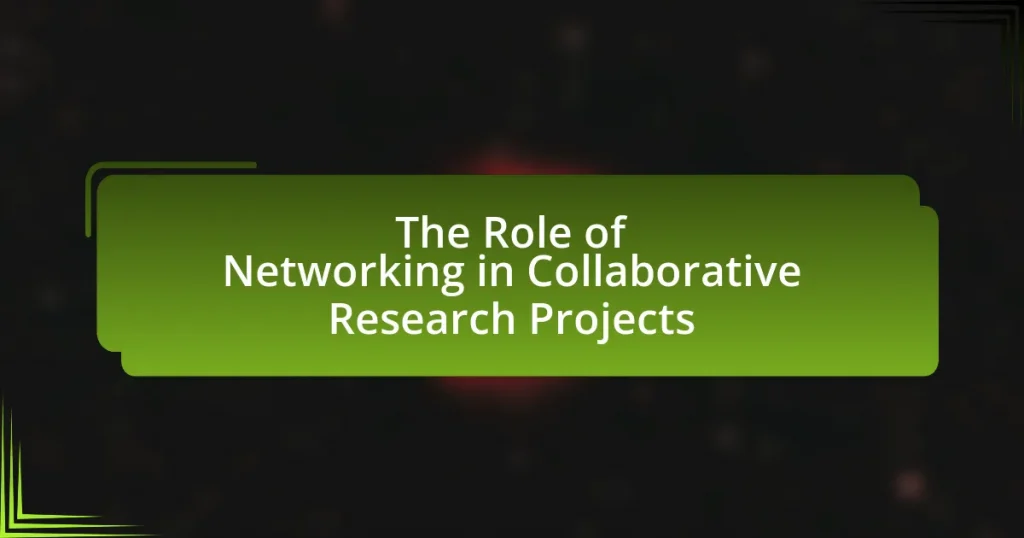The article focuses on networking opportunities for underrepresented groups in the field of chemistry, highlighting the importance of professional organizations, mentorship programs, and targeted conferences aimed at enhancing diversity. It discusses how these networking avenues facilitate access to resources, career advancement, and mentorship, which are crucial for overcoming systemic barriers faced by these groups. Additionally, the article outlines the role of mentorship in building professional connections, the challenges underrepresented individuals encounter in accessing networking opportunities, and strategies to improve inclusivity in networking events. It emphasizes the benefits of professional organizations and industry partnerships in fostering a supportive environment for diverse chemists.

What are Networking Opportunities for Underrepresented Groups in Chemistry?
Networking opportunities for underrepresented groups in chemistry include professional organizations, mentorship programs, and conferences specifically aimed at diversity. Organizations such as the National Organization for the Professional Advancement of Black Chemists and Chemical Engineers (NOBCChE) and the Society for Advancement of Chicanos/Hispanics and Native Americans in Science (SACNAS) provide platforms for networking, career development, and community building. These organizations often host events, workshops, and conferences that facilitate connections among members and industry professionals. Additionally, initiatives like the American Chemical Society’s Diversity and Inclusion Program promote networking through targeted events and resources designed to support underrepresented individuals in the field.
Why are networking opportunities important for underrepresented groups in chemistry?
Networking opportunities are crucial for underrepresented groups in chemistry because they facilitate access to resources, mentorship, and career advancement. These groups often face systemic barriers that limit their visibility and connections within the field. By participating in networking events, individuals can build relationships with established professionals, gain insights into career paths, and discover job opportunities that may not be widely advertised. Research indicates that diverse teams lead to more innovative solutions, highlighting the importance of inclusivity in scientific progress. For instance, a study published in the journal “Nature” found that diverse research teams produce more impactful scientific work, underscoring the need for networking to enhance representation and collaboration in chemistry.
How do networking opportunities impact career advancement in chemistry?
Networking opportunities significantly enhance career advancement in chemistry by facilitating connections that lead to job placements, collaborations, and mentorships. These connections often provide access to hidden job markets, as many positions are filled through referrals rather than public postings. Research indicates that professionals who actively engage in networking are more likely to receive job offers; for instance, a study published in the Journal of Chemical Education found that 70% of jobs are obtained through networking. Additionally, networking can help underrepresented groups in chemistry gain visibility and support, which is crucial for overcoming barriers in a predominantly male-dominated field.
What role does mentorship play in networking for underrepresented groups?
Mentorship plays a crucial role in networking for underrepresented groups by providing guidance, support, and access to professional connections. Mentors help individuals navigate the complexities of their fields, offering insights that can lead to valuable networking opportunities. For instance, a study published in the Journal of Chemical Education found that mentorship significantly enhances the career advancement of underrepresented minorities in STEM fields, as mentors often introduce mentees to their professional networks, facilitating connections that might otherwise be inaccessible. This access to networks can lead to collaborations, job opportunities, and increased visibility within the industry, ultimately contributing to a more diverse and inclusive professional landscape in chemistry.
What types of networking opportunities exist for underrepresented groups in chemistry?
Underrepresented groups in chemistry can access various networking opportunities, including professional organizations, mentorship programs, conferences, and online platforms. Professional organizations such as the National Organization for the Professional Advancement of Black Chemists and Chemical Engineers (NOBCChE) and the Society for Advancement of Chicanos/Hispanics and Native Americans in Science (SACNAS) provide resources and networking events tailored to these communities. Mentorship programs, like those offered by the American Chemical Society (ACS), connect underrepresented students with experienced professionals in the field. Additionally, conferences often feature specific sessions or workshops aimed at fostering connections among diverse participants. Online platforms, including social media groups and forums, also facilitate networking by allowing individuals to share experiences and opportunities. These avenues collectively enhance visibility and support for underrepresented groups in the chemistry field.
What are the benefits of professional organizations and associations?
Professional organizations and associations provide numerous benefits, including networking opportunities, professional development, and access to resources. These organizations facilitate connections among members, allowing individuals to build relationships that can lead to collaborations, mentorships, and job opportunities. For instance, the American Chemical Society offers networking events and conferences specifically designed for underrepresented groups in chemistry, fostering an inclusive environment that enhances career advancement. Additionally, these associations often provide educational resources, such as workshops and webinars, which help members stay updated on industry trends and improve their skills. Research indicates that participation in professional organizations can significantly enhance career prospects, as members often report higher job satisfaction and increased professional visibility.
How do conferences and workshops facilitate networking?
Conferences and workshops facilitate networking by providing structured environments where individuals can connect, share ideas, and collaborate. These events often include sessions designed for interaction, such as breakout discussions, panel Q&As, and social gatherings, which encourage participants to engage with one another. Research indicates that 70% of professionals attribute their career success to networking opportunities gained at conferences and workshops, highlighting their effectiveness in fostering professional relationships.
What challenges do underrepresented groups face in accessing networking opportunities?
Underrepresented groups face significant challenges in accessing networking opportunities, primarily due to systemic barriers, lack of representation, and limited access to resources. Systemic barriers include institutional biases that favor established networks, making it difficult for individuals from underrepresented backgrounds to gain entry. Additionally, the lack of representation in professional settings can lead to feelings of isolation and discourage participation in networking events. Limited access to resources, such as mentorship programs and funding for attendance at conferences, further exacerbates these challenges. For instance, a study published in the Journal of Chemical Education found that minority students often lack access to professional networks that are crucial for career advancement, highlighting the need for targeted initiatives to bridge these gaps.
How do systemic barriers affect participation in networking events?
Systemic barriers significantly hinder participation in networking events for underrepresented groups in chemistry. These barriers include socioeconomic factors, lack of access to information, and institutional biases that create an uneven playing field. For instance, individuals from marginalized backgrounds may face financial constraints that limit their ability to attend events, as evidenced by a study from the National Science Foundation, which found that 40% of underrepresented minorities in STEM reported financial limitations as a barrier to participation in professional gatherings. Additionally, the absence of mentorship and sponsorship opportunities exacerbates these challenges, as highlighted in research by the American Chemical Society, which indicates that networking is often facilitated through established connections that underrepresented groups may lack. Thus, systemic barriers create a cycle of exclusion, preventing equitable access to valuable networking opportunities in the field of chemistry.
What strategies can be employed to overcome these challenges?
To overcome challenges in networking opportunities for underrepresented groups in chemistry, targeted mentorship programs can be implemented. These programs connect experienced professionals with underrepresented individuals, providing guidance, support, and access to valuable networks. Research indicates that mentorship significantly enhances career advancement and professional development, as evidenced by a study published in the Journal of Chemical Education, which found that mentees reported increased confidence and opportunities for collaboration. Additionally, creating inclusive networking events that prioritize diversity can foster a sense of belonging and encourage participation from underrepresented groups, as shown by initiatives like the American Chemical Society’s Project SEED, which successfully engages diverse high school students in chemistry.
How can institutions support networking for underrepresented groups in chemistry?
Institutions can support networking for underrepresented groups in chemistry by creating targeted mentorship programs that connect these individuals with established professionals in the field. Research indicates that mentorship significantly enhances career development and networking opportunities, particularly for underrepresented minorities. For example, a study published in the Journal of Chemical Education found that mentorship programs increased retention rates and professional engagement among minority students in STEM fields. Additionally, institutions can host inclusive networking events and workshops that focus on the unique challenges faced by underrepresented groups, fostering a sense of community and collaboration. By implementing these strategies, institutions can effectively enhance networking opportunities and support the professional growth of underrepresented individuals in chemistry.
What initiatives can universities implement to enhance networking opportunities?
Universities can implement mentorship programs that connect students with industry professionals to enhance networking opportunities. These programs facilitate direct interactions, allowing students to gain insights and build relationships that can lead to internships and job placements. Research indicates that mentorship significantly improves career outcomes; for instance, a study published in the Journal of Career Development found that mentees are more likely to secure employment and advance in their careers compared to those without mentors. Additionally, universities can host networking events specifically tailored for underrepresented groups in chemistry, fostering an inclusive environment that encourages collaboration and support among peers and professionals.
How can industry partnerships improve networking access?
Industry partnerships can improve networking access by providing underrepresented groups in chemistry with direct connections to established professionals and organizations. These partnerships facilitate mentorship opportunities, access to industry events, and collaborative projects, which enhance visibility and integration within the professional community. For instance, a study by the American Chemical Society found that mentorship programs linked to industry partnerships significantly increased networking opportunities for minority chemists, leading to higher career advancement rates. This evidence underscores the effectiveness of industry collaborations in bridging gaps and fostering inclusive networking environments.
What are effective strategies for individuals to network successfully in chemistry?
Effective strategies for individuals to network successfully in chemistry include attending conferences, joining professional organizations, and utilizing social media platforms. Attending conferences allows individuals to meet experts and peers in the field, facilitating direct interactions and collaborations. Joining professional organizations, such as the American Chemical Society, provides access to resources, mentorship opportunities, and networking events tailored for chemists. Utilizing social media platforms like LinkedIn enables individuals to connect with professionals globally, share research, and engage in discussions relevant to their interests. These strategies are supported by studies indicating that networking significantly enhances career opportunities and professional growth in scientific fields.
How can one leverage social media for networking in the chemistry field?
One can leverage social media for networking in the chemistry field by actively engaging with relevant communities and professionals on platforms like LinkedIn, Twitter, and ResearchGate. By sharing research findings, participating in discussions, and following influential chemists, individuals can enhance their visibility and connect with peers and mentors. For instance, a study published in the Journal of Chemical Education highlights that 70% of chemists use social media to network and collaborate, demonstrating its effectiveness in fostering professional relationships. Engaging in hashtags related to chemistry, such as #ChemTwitter, can also facilitate connections with a broader audience, further expanding networking opportunities.
What tips can help individuals build meaningful connections in professional settings?
To build meaningful connections in professional settings, individuals should actively engage in networking by attending industry events and participating in discussions. Engaging in these activities allows individuals to meet peers and mentors, fostering relationships that can lead to collaboration and support. Research indicates that networking can significantly enhance career opportunities; for instance, a study published in the Journal of Applied Psychology found that 70% of jobs are obtained through networking. Additionally, individuals should focus on authentic communication, demonstrating genuine interest in others’ work and experiences, which can strengthen connections and create a supportive professional network.
What resources are available for underrepresented groups seeking networking opportunities in chemistry?
Underrepresented groups seeking networking opportunities in chemistry can access resources such as the National Organization for the Professional Advancement of Black Chemists and Chemical Engineers (NOBCChE), which provides mentorship, scholarships, and networking events specifically for Black chemists. Additionally, the American Chemical Society (ACS) offers programs like the ACS Scholars Program, which supports underrepresented students in chemistry through networking and professional development opportunities. Furthermore, organizations like the Society for Advancement of Chicanos/Hispanics and Native Americans in Science (SACNAS) facilitate networking through conferences and workshops aimed at promoting diversity in STEM fields, including chemistry. These resources are validated by their established programs and initiatives that have successfully supported underrepresented individuals in the chemistry community.
What online platforms provide networking resources specifically for chemists?
Online platforms that provide networking resources specifically for chemists include ResearchGate, LinkedIn, and ChemSpider. ResearchGate allows chemists to share research, collaborate, and connect with peers globally, facilitating professional networking. LinkedIn offers a broad professional network where chemists can join groups, follow industry leaders, and engage in discussions relevant to their field. ChemSpider, a free chemical structure database, also serves as a networking tool by connecting chemists with resources and communities focused on chemical research. These platforms collectively enhance networking opportunities for chemists, particularly those from underrepresented groups in the field.
How can local community organizations assist in networking efforts?
Local community organizations can assist in networking efforts by providing platforms for collaboration and connection among underrepresented groups in chemistry. These organizations often host events, workshops, and seminars that facilitate interactions between individuals, fostering relationships that can lead to mentorship and career opportunities. For instance, organizations like the National Organization for the Professional Advancement of Black Chemists and Chemical Engineers (NOBCChE) create networking events specifically aimed at connecting minority professionals in the field, which has been shown to enhance career advancement and professional development.
What best practices can enhance networking experiences for underrepresented groups in chemistry?
Best practices that can enhance networking experiences for underrepresented groups in chemistry include creating inclusive networking events, providing mentorship programs, and fostering partnerships with organizations that support diversity. Inclusive networking events, such as conferences and workshops, should prioritize accessibility and representation, ensuring that speakers and panelists reflect diverse backgrounds. Research shows that mentorship significantly impacts career advancement; thus, establishing structured mentorship programs can help underrepresented individuals navigate their professional paths. Additionally, partnerships with organizations like the National Organization for the Professional Advancement of Black Chemists and Chemical Engineers (NOBCChE) can provide resources and support networks, further enhancing opportunities for connection and collaboration within the chemistry community.



